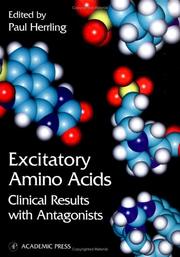| Listing 1 - 3 of 3 |
Sort by
|

ISBN: 9780125468206 0125468202 9780080531342 0080531342 9786611033484 1281033480 Year: 1997 Publisher: San Diego, Calif. : Academic Press,
Abstract | Keywords | Export | Availability | Bookmark
 Loading...
Loading...Choose an application
- Reference Manager
- EndNote
- RefWorks (Direct export to RefWorks)
Glutamate is the major excitatory neurotransmitter in the brain and dysfunction of glutamate transmission is the likely cause of a variety of diseases including neurodegeneration following cerebral ischemia, Huntington's chorea, amyotrophic lateral sclerosis, epilepsy, spasticity, emesis, chronic pain, and schizophrenia. Excitatory amino acid receptor agonists and antagonists are therefore of major interest as potential drugs for central nervous system disorders. Excitatory Amino Acids is the first book entirely dedicated to the results of human testing of modulators of excitatory amino
Excitatory amino acids. --- Excitatory amino acids --- Methyl aspartate --- Methyl aspartic acid --- Methylaspartate --- Methylaspartic acid --- N-methyl-D-aspartate --- N-methyl-D-aspartic acid --- NMDA (Chemistry) --- Aspartic acid --- Amino acid neurotransmitters --- Pathophysiology. --- Receptors.

ISBN: 9780125468206 0125468202 9780080531342 0080531342 1281033480 9786611033484 Year: 1997 Publisher: San Diego Academic Press
Abstract | Keywords | Export | Availability | Bookmark
 Loading...
Loading...Choose an application
- Reference Manager
- EndNote
- RefWorks (Direct export to RefWorks)
Glutamate is the major excitatory neurotransmitter in the brain and dysfunction of glutamate transmission is the likely cause of a variety of diseases including neurodegeneration following cerebral ischemia, Huntington's chorea, amyotrophic lateral sclerosis, epilepsy, spasticity, emesis, chronic pain, and schizophrenia. Excitatory amino acid receptor agonists and antagonists are therefore of major interest as potential drugs for central nervous system disorders. Excitatory Amino Acids is the first book entirely dedicated to the results of human testing of modulators of excitatory amino
Excitatory amino acids. --- Excitatory amino acids --- Methyl aspartate --- Pathophysiology. --- Receptors.
Book

ISBN: 012200745X Year: 1993 Publisher: London ; San Diego ; New York Academic press
Abstract | Keywords | Export | Availability | Bookmark
 Loading...
Loading...Choose an application
- Reference Manager
- EndNote
- RefWorks (Direct export to RefWorks)
| Listing 1 - 3 of 3 |
Sort by
|

 Search
Search Feedback
Feedback About UniCat
About UniCat  Help
Help News
News